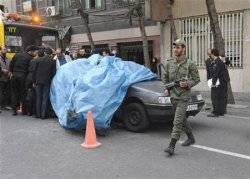A nuclear scientist who supervised a department at the Natanz uranium enrichment facility has been killed by a magnetic bomb placed on his car by two assailants in northern Tehran, Iranian media reported.
The attack strongly resembles earlier killings of scientists working on the country's controversial nuclear programme.
The bomb explosion killed Mostafa Ahmadi Roshan, a chemistry expert and a director of the Natanz facility in central Iran, the semi-official Fars news agency reported.
Vice President Mohammad Reza Rahimi said Israeli agents were behind the attack, but said they cannot "prevent progress'' in what Iran claims are peaceful nuclear efforts.
Safar Ali Baratloo, a senior security official, was also quoted by Fars as saying the attack was the work of Israelis.
"The magnetic bomb is of the same types already used to assassinate our scientists," he said.
Roshan, 32, was inside the Iranian-assembled Peugeot 405 with two others when the bomb exploded near Gol Nabi Street, Fars reported.
Fars described the explosion as a "terrorist attack" targeting Roshan, a graduate of the prestigious Sharif University of Technology in Tehran.
"The deputy governor of Tehran is blaming [the attack] on Israel, saying it wants to destabilise the country ahead of presidential elections in March," Al Jazeera's Dorsa Jabbari said.
"But it's unclear as to how, in such a secure city as Tehran, such attacks can take place over and over again."
Previous attacks
Ahmadi Roshan was "working as the deputy in charge of commerce at the Natanz [uranium enrichment] site", said a posting on Sharif University's website. "He was working on project of making polymeric membrane for separating gas."
A similar bomb explosion on January 12, 2010, killed Masoud Ali Mohammadi, a senior physics professor at Tehran University, when a bomb-rigged motorcycle exploded near his car as he was about to leave for work.
In November 2010, a pair of back-to-back bomb attacks in different parts of the capital killed one nuclear scientist and wounded another.
The slain scientist, Majid Shahriari, was a member of the nuclear engineering faculty at Shahid Beheshti University in Tehran and co-operated with the Atomic Energy Organisation of Iran.
The wounded scientist, Fereidoun Abbasi, was almost immediately appointed head of Iran's atomic agency.
In July 2011, motorcycle-riding gunmen killed Darioush Rezaeinejad, an electronics student. Other reports identified him as a scientist involved in suspected Iranian attempts to make nuclear weapons.
Rezaeinejad allegedly participated in developing high-voltage switches, a key component in setting off the explosions needed to trigger a nuclear warhead.
Imad Khadduri, a nuclear expert, told Al Jazeera, "There are hundreds, if not thousands, of such scientists", beyond the five targeted in recent attacks.
He said the string of assassinations was "100 per cent Mossad [Israel's secret service]", but he called the victims "small fish".
Wednesday's assassination is "evidence of [foreign] government-sponsored terrorism" but will not stop Iran's nuclear programme, Rahimi told state television.
"Today those who claim to be combating terrorism have targeted Iranian scientists," he said. "They should know that Iranian scientists are more determined than ever in striding towards Iran's progress."
The US and Israel say Iran is trying to develop nuclear weapons technology. Iran denies the allegations, saying that its programme is intended for peaceful purposes.
Reacting to the Tehran attack, Tommy Vietor, spokesman for the US National Security Council, said: "The United States had absolutely nothing to do with this. We strongly condemn all acts of violence, including acts of violence like what is being reported today."
Israel angle
There was no immediate word from officials in Israel, which has always declined comment on previous such bombings.
However, Ronen Bergman, an Israeli author and journalist, told Al Jazeera that "for years Mossad has a tradition of assassinating scientists", for two specific purposes.
"One target is to take out people of profound importance [to the project], and the second target is to spread fear among the other scientists that the same fate may happen to them as well."
According to Ronen, the assassination demonstrated that "someone is highly capable in recruiting people from within the project and sabotaging it".
Lieutenant-General Benny Gantz, Israel's military chief of staff, was quoted as saying on Tuesday that Iran should expect more "unnatural" events in 2012.
His comments, to a closed-door parliamentary panel, were widely interpreted as alluding to previous acts of sabotage.
"For Iran, 2012 is a critical year in combining the continuation of its nuclearisation, internal changes in the Iranian leadership, continuing and growing pressure from the international community and things which take place in an unnatural manner," Gantz was quoted as saying.
PHOTO CAPTION
Reuters and other foreign media are subject to Iranian restrictions on leaving the office to report, film or take pictures in Tehran. A policeman walks past the car belonging to Iranian nuclear scientist Mostafa Ahmadi-Roshan at a blast site outside a university in northern Tehran January 11, 2012.
Aljazeera


 Home
Home Discover Islam
Discover Islam Quran Recitations
Quran Recitations Lectures
Lectures
 Fatwa
Fatwa Articles
Articles Fiqh
Fiqh E-Books
E-Books Boys & Girls
Boys & Girls  Articles
Articles










